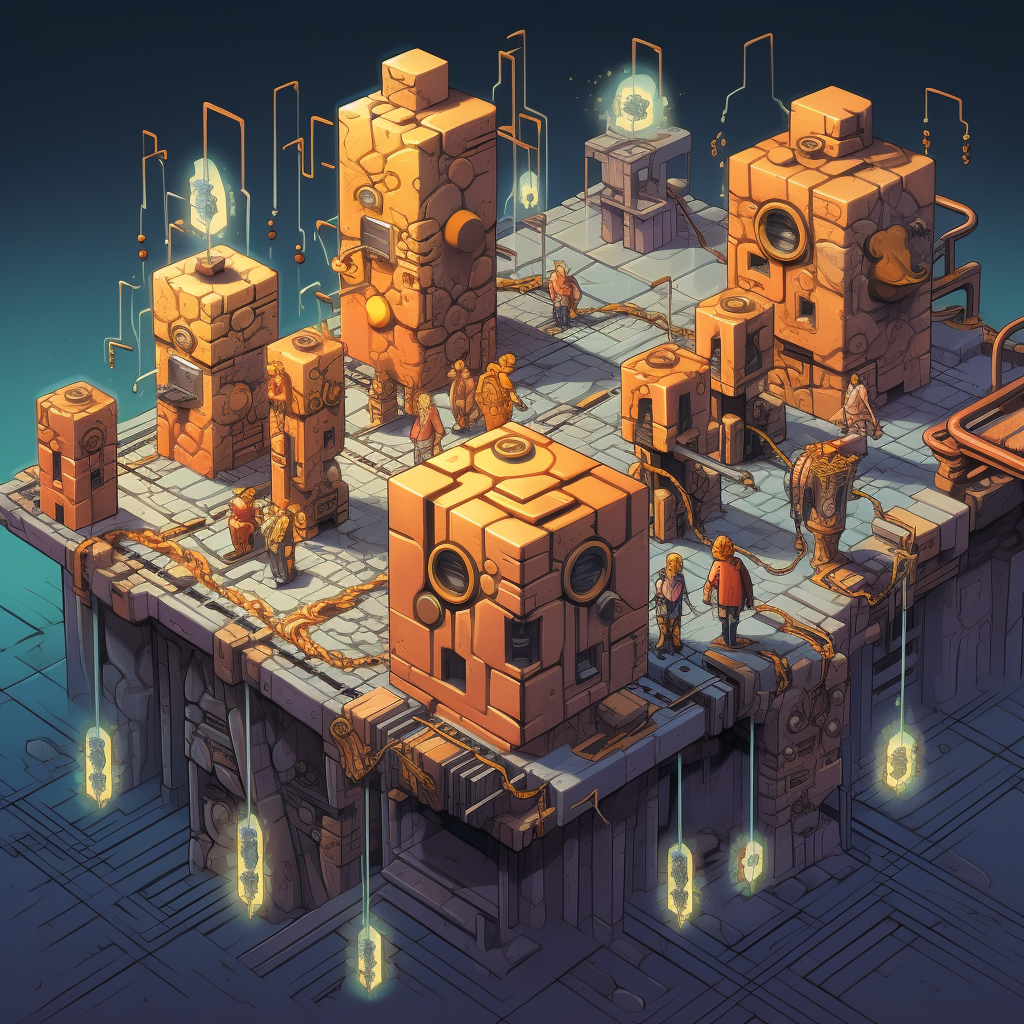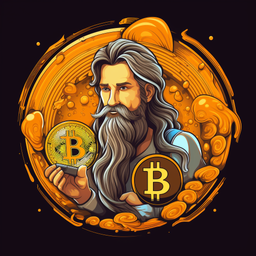Blockchain 101: Behind the Scenes in Bitcoin Technology
This exploration into the world of blockchain technology reveals its integral role in Bitcoin and its transformative effects across multiple industries.

As you've likely heard, Bitcoin has been making waves as the first and most popular cryptocurrency. But did you know that behind Bitcoin's rise to fame, there's a revolutionary technology at work, quietly powering each transaction? That technology is Blockchain.
Exploring Blockchain's Integral Role in Bitcoin Technology
Think of Blockchain as the backbone of Bitcoin! It's the underlying structure that provides a secure, decentralized method for recording Bitcoin transactions.
Here's an analogy to help illustrate this: if Bitcoin was an automobile, Blockchain would be its engine, driving it forward and making all of its operations possible.
Bitcoin transactions occur between peers, with no central authority like a bank overseeing the process. These transactions are grouped into blocks and added to a chain (hence the term "blockchain") in a linear, chronological order. This allows anyone on the network to track the history of Bitcoin transactions, all the way back to the first ("genesis") block.
In essence, Blockchain gives Bitcoin its integrity and transparency.
Unveiling Why Understanding Blockchain is Essential for Bitcoin Comprehension
Understanding how Blockchain works is crucial to getting a complete grasp of Bitcoin.
That's because the value and security of Bitcoin are intrinsically tied to the Blockchain's features.
These include decentralization (meaning no single entity controls the data), immutability (meaning once data is recorded, it can't be changed), and transparency (meaning all transaction data is public and verifiable).
Breaking It Down: Your Simple Guide to Understanding Blockchain
Demystifying Blockchain: Its Purpose and Function in Plain Language
So, what exactly is Blockchain, and why was it created? In the simplest terms, a blockchain is a type of database.
But instead of storing data in a central location, the information is distributed across a network of computers, known as nodes. Each node has a complete copy of the blockchain and checks new transactions against this copy, making fraud incredibly difficult.
The "blocks" in a blockchain contain batches of transactions.

Once these transactions are verified, they're sealed with a unique cryptographic signature and added to the "chain". This creates a chronological record of transactions that is nearly impossible to tamper with, providing a secure way to transfer digital assets like Bitcoin.
Emphasizing the Uniqueness and Importance of Blockchain in the Crypto World
Blockchain is not just a technological marvel; it's a game-changer in the world of finance and beyond!
Its decentralized and transparent nature challenges traditional models of transactions. It removes the need for intermediaries like banks or governments, allowing for faster, cheaper, and more secure transactions.
Furthermore, the use of Blockchain extends beyond Bitcoin.
Industries as varied as healthcare, supply chain, and real estate are finding ways to leverage Blockchain for secure record-keeping, streamlined processes, and increased transparency.
In the world of Bitcoin, understanding Blockchain is akin to knowing the rules of the game. It empowers you to participate confidently, discern opportunities, and navigate challenges in the ever-evolving crypto landscape.
Behind the Scenes: Blockchain in Layman's Terms
Unpacking the Fundamental Building Blocks of Blockchain
To truly grasp Blockchain, it's essential to understand its basic components. A blockchain is composed of a series of 'blocks', each containing a list of transactions.
Every time a new transaction occurs, it's added to a block. Once a block is full, it's sealed with a unique cryptographic signature, a 'hash', and a new block is formed.
This new block contains its own hash and the hash of the previous block, thus forming a chain of blocks - a Blockchain.
This interlocking makes altering a block's content nearly impossible, as it would require changing the information in all subsequent blocks.
Tracing the Origins of Blockchain and the Problem it Solves in Digital Transactions
Blockchain was first introduced in 2008 by an entity (or individual) known as Satoshi Nakamoto as a solution to a significant problem in digital transactions: double-spending. This is a fraudulent tactic where the same digital currency is spent more than once, possible due to the ease of replicating digital information.

Blockchain's brilliance lies in its decentralized nature, which allows for transactions to be publicly recorded and verified by the collective power of computers worldwide.
This eliminates the need for a central authority, like a bank, to approve transactions, thereby making digital transactions more efficient, transparent, and secure.
Mapping How Blockchain Operates in Typical Scenarios and Why it's Relevant
In a typical scenario, when a Bitcoin transaction is initiated, it's broadcasted to a network of computers, or nodes. These nodes validate the transaction, ensuring the sender has enough Bitcoin to complete the transaction and hasn't spent it elsewhere.
Once validated, the transaction is added to a block. When the block is full, it's added to the blockchain, providing a permanent, transparent record of the transaction.
This process of adding blocks to the blockchain ensures that Bitcoin and other digital assets are securely transferred, providing a level of trust and security that was previously unimaginable in the world of digital transactions.
Highlighting Other Applications and Variations of Blockchain Technology
While Blockchain is most widely recognized for its role in cryptocurrencies, its potential applications are vast and varied.
For instance, in supply chain management, Blockchain can provide a transparent, immutable record of product movement, ensuring authenticity and reducing fraud.
In healthcare, it could enable giving back control of the data and identity of patients records back to them, enabling secure sharing of information between healthcare providers.
Moreover, variations of Blockchain technology have emerged, such as private blockchains, which limit who can participate in the network, and hybrid models that offer a blend of public and private features.
Seeing Is Believing: Real-Life Applications and Scenarios of Blockchain
Presenting Real-World Uses of Blockchain Beyond Bitcoin
Blockchain technology has rapidly moved beyond Bitcoin and digital currencies. Real-world examples of its use are increasing every day.
For example, Estonia has implemented Blockchain to secure health records and other government data.
De Beers, the diamond giant, uses Blockchain to track the journey of diamonds, ensuring they are ethically sourced.

Imagining Potential Scenarios where Understanding Blockchain Can Provide an Advantage
The increasing prevalence of Blockchain in various sectors implies that understanding this technology could be a significant advantage.
For instance, if you're in logistics or supply chain management, Blockchain could be used to streamline and secure processes. In finance, Blockchain can facilitate faster, cheaper, and more secure transactions.
Even as a consumer, understanding Blockchain can provide an edge. You'll be more informed and confident when investing in cryptocurrencies, and you'll better understand the technology behind many future innovations.
The future is wide open for Blockchain, and being fluent in its operations can only open doors.
Blockchain and You: The Impact on Your Life and Society
Pondering the Possible Impacts of Blockchain's Rise on Personal and Financial Decisions
The rise of blockchain technology could significantly influence personal and financial decisions. As the digital world grows, understanding technologies like blockchain can become increasingly critical for navigating digital finance.
If you're an investor, it opens a whole new arena of investment opportunities.
Understanding blockchain can also make you more comfortable using and benefiting from applications that leverage this technology.
It's not just about cryptocurrencies - blockchain is revolutionizing many sectors, so its rise could potentially influence decisions in areas like data privacy, banking, healthcare, and more.
Discussing the Broader Societal and Economic Implications of Blockchain Technology
The economic implications of blockchain technology are profound. By enabling peer-to-peer transactions with no need for intermediaries, blockchain can significantly reduce costs in various industries.
For society, the increased transparency and security offered by blockchain can improve systems like voting, contract signing, and public service delivery, to name a few.
At the same time, blockchain may also present challenges that society will need to tackle, such as regulatory issues and the digital divide.
While blockchain technology can promote financial inclusion, those without access to digital technology might be left behind.
Facing the Music: Addressing Common Misconceptions and Fears about Blockchain
Debunking Common Misconceptions about Blockchain
One common misconception about blockchain is that it's solely for cryptocurrencies.
As we've discussed, blockchain has applications far beyond digital currencies. Another misconception is that all blockchains are public and transparent.
However, different types of blockchains exist, including private ones, where access is restricted.
Many also believe that blockchain data is completely unhackable.
While blockchain's design does make it highly secure, it's not entirely impervious. Security largely depends on its implementation and usage.
In our opinion, the only unhackable blockchain is Bitcoin!
Alleviating Fears about Blockchain: Explaining Why They Might be Unfounded
Blaming blockchain technology for illegal activities is like blaming the internet for cybercrime. It's a tool, and its usage depends on the user.
As for concerns about the technology being too complex, remember that you don't need to understand the intricacies of how a car works to drive one.
The same applies to blockchain. It's a transformative technology, and understanding its basic principles is the first step towards embracing its potential.
The Road Ahead: Navigating Blockchain with Confidence
Summarizing the Essential Blockchain Takeaways for Beginners
Blockchain technology, at its core, is a decentralized ledger that maintains a record of transactions across various computers. It is foundational to Bitcoin!
Understanding its basic concepts is key to appreciating the potential impacts of this revolutionary technology on our society and economy.
Blockchain's strengths lie in its decentralization, transparency, and security, making it resistant to fraud and censorship.
However, as with any technology, it's important to remember that its applications can be both positive and negative, depending largely on how it's used.
Further Exploration
Ready to deepen your understanding of blockchain and Bitcoin? Here are some top resources:
- Podcast: The Beginner’s Guide To Bitcoin: An excellent resource that breaks down the complexities of Bitcoin in a digestible manner. Listen here
- Book: The Little Bitcoin Book: Why Bitcoin Matters for Your Freedom, Finances, and Future: A great primer on why Bitcoin and blockchain technology are transformative. Available in most bookstores and online.
- Bitcoin Talk: Introduction to Bitcoin: A comprehensive video explaining the essence of Bitcoin and its significance. Watch here
- Slide Deck: A Friendly Introduction To Bitcoin: An engaging presentation that covers the basics of Bitcoin and blockchain technology. View here
Call-to-Action
There's a lot more to learn about blockchain, Bitcoin, and the wider world of cryptocurrencies. Don't stop here—continue exploring, asking questions, and engaging with the crypto community.
Remember, knowledge is power, and in a rapidly evolving digital world, staying informed is key.
For more insights and in-depth analyses on Bitcoin and its underlying technology, keep following our platform.
We're committed to providing you with reliable, easy-to-understand, and up-to-date information to help you navigate the crypto space confidently. Join us on this exciting journey into the future of finance!


